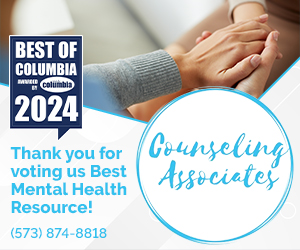Illustration provided by Burrell Behavioral Health
The holiday season brings so much with it — celebrations, family gatherings, traditions, dinners and more. And while each piece brings its own layer of fun and revelry, this season also can bring some less welcome feelings, like stress and anxiety.
“There’s this duality at the holidays where it’s like we feel like we should be happy, we should be joyful, we should be excited,” says Bailey Pyle.
Pyle is the licensed mental health provider for Burrell Behavioral Health’s Be Well Initiatives. The Be Well programs focus on providing tools and resources to build a wellness community that seeks to “help enhance the emotional health and well-being of individuals, organizations and communities.”
When it comes to the holiday season, Pyle says it’s easy to get caught up in what should be happening, instead of taking a beat and examining what you’re actually feeling and getting to the reason for that. But that introspection can bring up another feeling many are all too familiar with — guilt. “Then we feel guilty when we are not just full of joy and hope and cheer when the reality is holidays can be a very stressful time for all of us,” Pyle says.
Through Be Well, Pyle is able to focus on preventative measures to help people focus on self-care in small, sustainable ways, including a variety of tools and resources available at bewellcommunity.org. These include links to regular Zoom meetings where participants can connect with others and a licensed provider, as well as self-care challenges, a community playlist and a feelings finder.
The Trials of Traditions
One difficulty about the holiday season is its traditions. Every family creates different traditions over the years, and when families begin to change, those traditions can become a little more troublesome. “With the holidays being a space where we are so often rooted in tradition, I think sometimes we become hesitant … to examine are these really working for us,” Pyle says. “Sometimes there’s that hesitancy to pause and assess: OK, this has been a ritual and routine and a tradition for us, but is it working still? And if it’s not, how can we adjust it so it will work for us?”
Those family changes could be anything from welcoming new members to adjusting to the loss of a loved one. When families begin to look different, it may be time to assess whether particular traditions are continuing to work, but that means having honest, open conversations with everyone involved, and that can be tricky, Pyle says. That’s why it’s important to be “realistic about what is important for us to hold on to, what are we willing to adjust or move so this better suits everybody and where we are now this season,” she says.
Celebrating After Loss
After the loss of a loved one, the holiday season can be particularly tough. Because every family is different, Pyle says it’s important to assess where everyone is and find the best way to move forward. For some, it may be naming that exact loss and filling the season with memories and recollections of moments. But others may find that method more difficult to deal with, which is why Pyle emphasizes taking the time to figure out what you need and maybe finding another family member who relates in the same way. “Everybody’s grief process is different, and everybody is in a different stage of grief, whether it’s the first Christmas or the 10th Christmas,” Pyle says. “We all process that so differently and there’s really no timeline for it.”
And if talking isn’t something that you’re up to, Pyle says to remember that you are allowed to step away and remove yourself from the conversation. “Take a moment to step outside and just notice what you see, smell, hear, feel or going to the bathroom; just doing whatever we need to do to give ourselves that grace and space,” she says.
While that may seem like a simple and easy concept, it can be an extremely difficult thing for so many. As Pyle notes, many people are great caretakers, able to validate and give understanding to others, but are much harder on themselves. Pyle says it’s important to give your feelings validation and allow yourself “a bit of compassion and love for where we are in that moment.”
A Preventative Mindset
Pyle says one of the initiatives they do each year is Be Well for the Holidays, which is a virtual experience that helps peo- ple get into a “preventative mindset of where am I and how can I best be prepared before all of the beautiful, wonderful, messy chaos starts?”
In fact, she says, incorporating some relaxation techniques or activities into your regular routine will make it easier to use them when really needed. “When our brains are in that state of crisis or overwhelm or stress, it’s harder for us to cog- nitively think about those things that help us,” Pyle says. “If we’re practicing or thinking about those things beforehand, it can kind of set us up to better manage or better navigate and walk through those situations.”
To find more resources or take part in the Be Well initiatives, visit bewellcommunity.org.
Overwhelmed?
Take a minute for yourself and try one of these methods to bring yourself back into the moment.
- Take deep breaths.
- Vent to a friend.
- Listen to a favorite song.
- Enjoy a moment of bonding with a child or pet.
- Watch a funny video.
- Find moments of small beauty, like noticing the lights on your Christmas tree or the way leaves fall to the ground (or even snow).
- Doodle or color for a few minutes.
- Take a walk.
5 Tips to Help During the Holidays
- Say ‘No’ if you feel overwhelmed. Don’t be afraid to decline an invitation or politely refuse to host an annual event if the idea of doing so is taking all the fun out of the season.
- Be kind to your wallet. The holidays can be expensive for everyone and financial strain can cause anxiety and stress. Consider opting out of gift exchanges and instead suggesting low-cost or free activities to share with loved ones.
- Know when to end unwanted conversations. If things start taking a turn for the worse, leave the room or step outside to remove yourself from the situation before things escalate.
- Honor those who have passed on. It’s OK to be sad during the holiday season. But you can cope by honoring their memory rather than mourning their absence.
- Don’t be alone if you don’t want to. There is nothing wrong with spending the season in solitude if that’s what you want. But if you’re lonely and don’t have family or friends to turn to, consider finding a way to volunteer or looking online for others to spend time with.
Information from Mental Health America. Find more at bit.ly/MHAholidays.



















